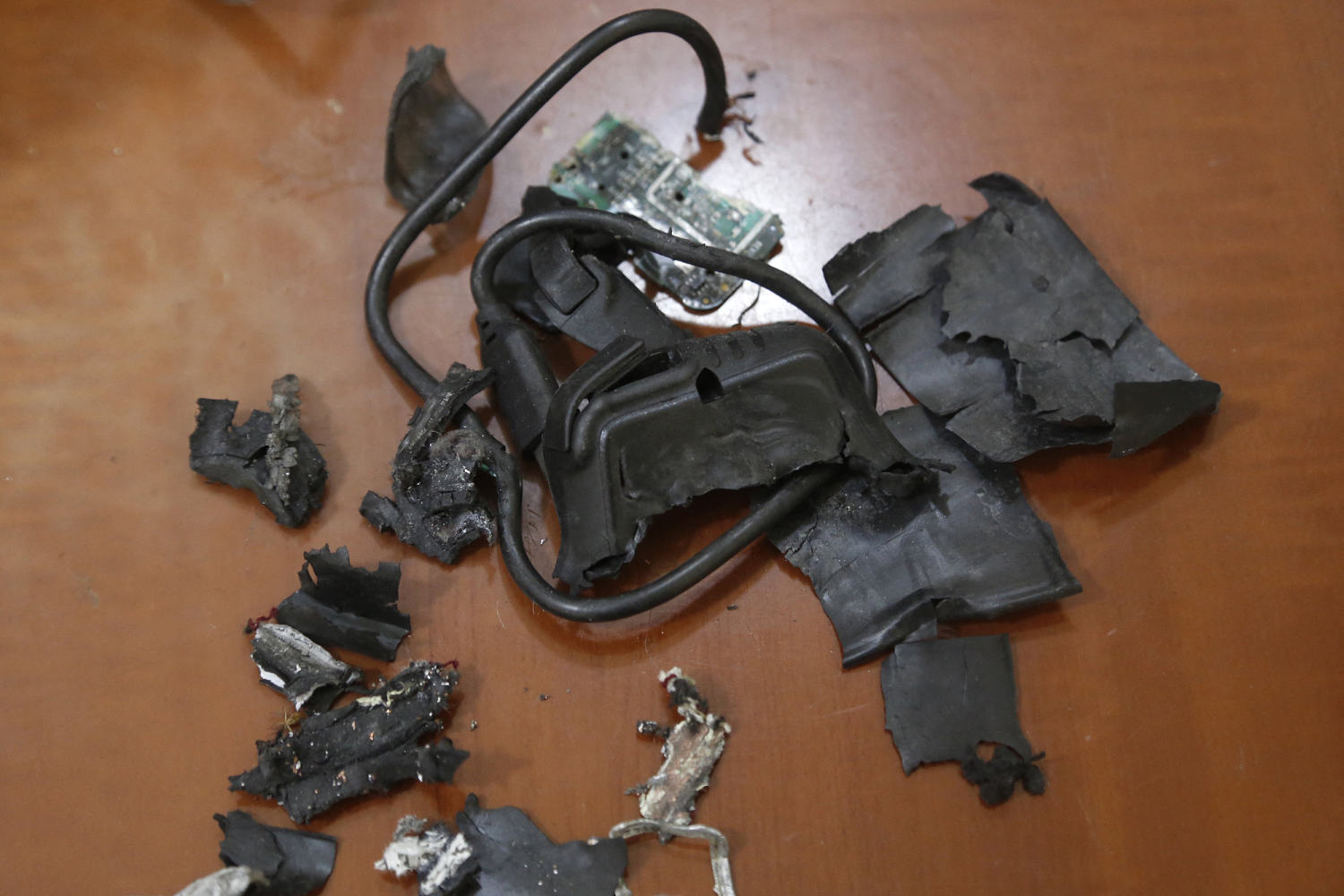Politics
How exploding pagers in Lebanon boost the risk of Israel fighting two full wars

To say that Hezbollah, the Iranian-backed militia in Lebanonhas gone through a rough couple of days would be a massive understatement. The group — which runs Southern Lebanon as its own personal fiefdom, boasts tens of thousands of hardened fighters and possesses as many as 150,000 rockets in its inventory — is confronting a degree of internal chaos that its leadership isn’t habituated to experiencing.
By Hezbollah’s own admission, the presumed Israeli operation was the ‘biggest security breach’ the group has ever witnessed.
On Sept. 17, thousands of pagers used by Hezbollah members across Lebanon exploded simultaneously in what is very likely an operation conducted by the MossadIsrael’s foreign intelligence agency. More than 2,700 people were injured, including Iran’s ambassador to Lebanon, and at least 12 people were killed in the explosions. The next day, a second wave of attacks occurredthis time targeting the handheld radios Hezbollah uses in the field. The attacks caused panic in Lebanon; the country’s Ministry of Public Health told hospitals to remain on maximum alert status to cope with the injuries. U.N. personnel in Lebanon were advised to remove the batteries from their phones as a precautionary measure.
By Hezbollah’s own admission, the presumed Israeli operation was the “biggest security breach” the group has ever witnessed.
While information is still fluid, reports suggest Israeli intelligence agents intercepted a shipment of pagers to Hezbollah and tinkered with the devices(possibly by hiding explosive material into the pagers’ batteries) before allowing the shipment to continue on to Lebanon. When the pagers received a messagedisguised as coming from Hezbollah’s leadership, the phones exploded. It’s the kind of well-planned, highly orchestrated, technologically sophisticated covert action for which the Mossad is well known. And if anybody has any doubts, just ask the Iranians, who in 2020 watched as one of their top nuclear scientists, Mohsen Fakhrizadeh, was assassinatedby a remote-controlled machine gunas he was traveling down a highway. The entire thing feels like an old episode of”24,”the action-packed show starring Kiefer Sutherland from the early “war on terror” of the 2000s.
There’s little doubt that Israel has scored a big tactical success. Hezbollah, one of Israel’s fiercest adversaries since the group was established in the early 1980s, will spend the next days, weeks and even months cracking down within its ranks, preoccupied with internal security and investigating how two similar, devastating strikes could happen within 24 hours of each other.
But as fascinating as the nuts-and-bolts of the operation are, there are deeper and more consequential questions at stake.
First, how will Hezbollah react?
The fact that Israel hasn’t officially claimed credit for the explosions doesn’t mean Hezbollah will hold off on attribution. Indeed, the group already blames Israel and is vowing to exact a price.
Presumably, Hezbollah means what it says; as one of the Middle East’s most powerful anti-Israel resistance movements, it can’t afford not to respond in some way, shape or form, even if it’s only through some kind of symbolic strike on Israeli military infrastructure near the Israel-Lebanon border.
Despite what some foreign policy heavyweights assert, tactical success doesn’t automatically equate to a strategic accomplishment.
Recall that last month, after Israel conducted preemptive airstrikes against thousands of Hezbollah rocket launchers, Hezbollah retaliated by sending its biggest fusilladeof rockets and missiles against targets in northern and central Israel — 320, to be exact. Fortunately, both sides chose to de-escalate after the daylong exchange of fire and return to the pre-August status quo, in which tit-for-tat fighting was largely confined to the Israeli-Lebanese border area. The latest Israeli attacks, however, risk unraveling that arrangement.
At the same time, Hezbollah isn’t a rash, illogical actor. Although Hezbollah leader Hassan Nasrallah won’t admit it openly, he understands that Israel has escalation dominance in this nearly yearlong struggle and could bring Lebanon into the Stone Age if it so desires. Hezbollah is therefore in a very tricky position — refusing to retaliate makes the organization look weak, impotent and compromised, encouraging even more daring Israeli attacks; but going too far on retaliation is liable to give Israeli Prime Minister Benjamin Netanyahu the excuse he needs to conduct the full-scale military operation that many within his government are clamoring for.
This is the last thing Hezbollah wants, if only because such a war — which would likely include an Israeli ground invasion to carve out a buffer zone in Southern Lebanon — would produce an economic and humanitarian catastrophe that would make the monthlong Israel-Hezbollah conflict in 2006 look like child’s play. Another war doesn’t serve Hezbollah’s interests.
Second, what is Israel trying to accomplish with these operations, exactly? It’s difficult to know. Some accounts suggestthat the altered pagers and radios were meant to be used during a war with Hezbollah, but that the trigger had to be pulled early because Hezbollah became suspicious that something was wrong with the devices. Viewed in this way, the Israelis decided to speed up the plot’s execution, lest all the time and planning they put into the operation proved to be wasted.
Regardless of the explanation, one wonders what Israel’s end-goal is with these operations.
Despite what some foreign policy heavyweights asserttactical success doesn’t automatically equate to a strategic accomplishment. Hezbollah, for instance, will evolve its own tactics, policies and procedures by battening down the hatches and ensuring its communications infrastructure — or what’s left of it — is better prepared to withstand similar technological feats. As a consequence of being utterly embarrassed on the international stage, Hezbollah will now be far more careful with how it communicates and enforce more discipline within its ranks, limiting the amount of information that Israel’s intelligence services will pick up.
Finally, what does this entire episode tell us about the U.S.-Israel relationship today?
Bluntly put, this week’s covert action underscores that Israel is going to do what it’s going to do, notwithstanding U.S. reservations about a particular course of action or whether it undermines U.S. diplomatic initiatives in the process.
This is particularly the case if Washington continues to refuse any conditionality on the relationship. One day before pagers exploded in Beirut, U.S. envoy Amos Hochstein was in Israel, trying to maintain some degree of calm between Israel and Hezbollah and trying to convince Netanyahu’s government that a wider war in Lebanon — particularly when Israeli troops are still fighting in Gaza — wasn’t in anybody’s interest. Despite the low odds, Washington hopes to strike a diplomatic arrangement that would avert conflict and allow hundreds of thousands of people in both Northern Israel and Southern Lebanon to return to their homes. Needless to say, that already difficult job has gotten a lot more difficult this week. Netanyahu knows this but doesn’t care — ultimately, he has concluded that the U.S. will offer unconditional support regardless of what he does.
Which leads to one more question that should at the very least be debated: Is it time for the U.S. to disabuse Netanyahu of that notion?
Daniel R. DePetris is a fellow at Defense Priorities and a syndicated foreign affairs columnist at the Chicago Tribune.
Politics
Shutdown anxiety rises on Capitol Hill amid Trump chaos

Washington is growing increasingly worried about the potential for a government shutdown — and what devastation it could bring…
Read More
Politics
Trump’s plan to ‘take over’ Gaza Strip confuses GOP lawmakers
President Donald Trump’s vague vow that the United States will “take over the Gaza Strip” is sparking quick pushback, and confusion, among some of his key allies in the Senate GOP. Trump provided no details during a press conference on Tuesday with Israeli Prime Minister Benjamin Netanyahu about how the United States would acquire the land…
Read More
Politics
Senate confirms Bondi for Attorney General
President Donald Trump’s nominee for attorney general, Pam Bondi, was confirmed by the Senate Tuesday evening, 54-46. Bondi, a staunch Trump loyalist, will now assume the role of top federal prosecutor. She is poised to be a key figure in efforts to transform the Department of Justice…
Read More
-

 The Josh Fourrier Show3 months ago
The Josh Fourrier Show3 months agoDOOMSDAY: Trump won, now what?
-
Economy3 months ago
Fed moves to protect weakening job market with bold rate cut
-
Economy3 months ago
It’s still the economy: What TV ads tell us about each campaign’s closing message
-
Economy3 months ago
Harris dismisses Trump as ‘not serious’ on the economy in BLN interview
-
Politics3 months ago
Donald Trump wants Americans to hate Kamala Harris — but he’s failing
-
Economy3 months ago
Biden touts economic gains, acknowledges a long way to go
-

 Politics3 months ago
Politics3 months agoDemocrats express concern over Gaetz pick
-

 Politics3 months ago
Politics3 months agoRFK Jr.’s bid to take himself off swing state ballots may scramble mail-in voting


